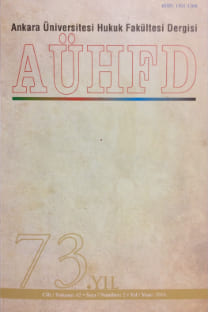ANAYASAL DEĞİŞİM
Constitutional Change
___
- Almond, Gabriel A., and Sidney Verba. The Civic Culture Revisited. Newbury Park, Calif: Sage Publications, 1989. Almond, Gabriel A., and Sidney Verba. The Civic Culture: Political Attitudes and Democracy in Five Nations. Princeton, N.J.: Princeton University Press, 1963. Arjomand, Said Amir. Constitutional Politics in the Middle East: With Special Ref erence to Turkey, Iraq, Iran, and Afghanistan. Oxford: Hart Pub, 2008. Banting, Keith G., and Richard Simeon. Introduction: The Politics of Constitutional Change in The Politics of Constitutional Change in Industrial Nations: Redesigning the State. London: Macmillan, 1984. Beach, Vincent. Charter of 1814. Edgar Leon Newman and Robert Lawrence Simpson eds. Historical Dictionary of France f rom the 1815 Restoration to the Second Empire. New York: Greenwood Press, 1987. Bihari, Ottó. The Constitutional Models of Socialist State Organization. Budapest: Akadémiai Kiadó, 1979. Bogdanor, Vernon. Conclusion in Constitutions in Democratic Politics, Vernon Bogdanor eds. Aldershot, Hants, England: Gower, 1988. Braithwaite, J. 1994. "A Sociology of Modelling and the Politics of Empowerment". The British Journal of Sociology. 45, no. 3: 445. Brissaud, Jean. A history of French public law. Boston: Little, Brown, 1915. Caenegem, R. C. van. An Historical Introduction to Western Constitutional Law. Cambridge: Cambridge University Press, 1995. Connelly, Owen. Historical Dictionary of Napoleonic France, 1799-1815. Westport, Conn: Greenwood Press, 1985. Dale, William. 1993. "The Making and Remaking of Commonwealth Constitutions". The International and Comparative Law Quarterly. 42, no. 1: 67. Davis, Helen Miller. Constitutions, Electoral Laws, Treaties of States in the Near and Middle East. Durham, N.C.: Duke University Press, 1953. Elder, Neil, Alastair H. Thomas, and David Arter. The Consensual Democracies?: The Government and Politics of the Scandinavian States. Oxford: Robertson, 1982. Fitzgibbon, Russell H. 1945. "IV. Constitutional Development in Latin America: A Synthesis". The American Political Science Review. 39, no. 3: 511. Franklin, Daniel P., and Michael J. Baun. Political Culture and Constitutionalism: A Comparative Approach. Armonk, N.Y.: M.E. Sharpe, 1995. Geddes, Barbara. 1995. "A Comparative Perspective on the Leninist Legacy in Eastern Europe". Comparative Political Studies. 28, no. 2: 239. Gella, Aleksander. Development of Class Structure in Eastern Europe Poland and Her Southern Neighbors. Albany: State University of New York Press, 1989. Go?nenç, Levent. Prospects f or Constitutionalism in Post-Communist Countries. The Hague: Nijhoff, 2002. Hayden, Joseph Ralston. New European Constitutions in Poland, Czechoslovakia and the Kingdom of the Serbs, Croates and Slovenes. American Political Science Review. XVI, no. 2. 1922. Henry, Clement M., and Ji-hyang Jang. The Arab Spring: Will It Lead to Democratic Transitions? New York: Palgrave Macmillan, 2013. Hesse, Joachim Jens. Constitutional Policy and Change in Europe: The Nature and Extent of the Challenges, in Constitutional Policy and Change in Europe, Joachim Jens Hesse and Nevil Johnson eds. Oxford: Oxford University Press, 1995. Huntington, Samuel P. The Third Wave: Democratization in the Late Twentieth Century. Norman: University of Oklahoma Press, 1991. Huntington, Samuel P., Çev: Ergun Özbudun. Üçüncü Dalga: Yirminci Yüzyıl Sonlarında Demokratlaşma. Ankara: Yetkin Yayınları, 1996. Kern, Robert, and Meredith D. Dodge. Historical Dictionary of Modern Spain, 1700-1988. New York: Greenwood Press, 1990. Kishimoto, Ko?ichi. Politics in Modern Japan: Development and Organization. Tokyo: Japan Echo, 1988. Lane, Jan-Erik. Constitutions and Political Theory. Manchester: Manchester University Press, 1996. Loewenstein, Karl. Constitutions, Constitutional Law. in Claus Dieter Kernig ed. Marxism, Communism, and Western Society; A Comparative Encyclopedia. New York: Herder and Herder, 1972, 169-190. Mansur, Fatma. Process of Independence. London: Routledge & Paul, 1962. Moore, Barrington. Social Origins of Dictatorship and Democracy: Lord and Peasant in the Making of the Modern World. Boston: Beacon Press, 1966. Opeskin, Brian. 2000. "Constitutional Modelling: The Domestic Effect of International Law in Commonwealth Countries, Part I". Public Law. 607. Opeskin, Brian. 2001. "Constitutional Modelling: The Domestic Effect of International Law in Commonwealth Countries - Part II". Public Law. 97. Patrick, Glenda M. Political Culture in Giovanni Sartori ed. Social Science Concepts: A Systematic Analysis. Beverly Hills, Calif: Sage Publications, 1984. Polonsky, Antony. The Little Dictators: The History of Eastern Europe Since 1918. London: Routledge & K. Paul, 1975. Seton-Watson, Hugh. Eastern Europe between the Wars, 1918-1941. New York: Harper & Row, 1967. Seton-Watson, Hugh. The East European Revolution. New York: Praeger, 1956. Sinjela, A. Mpazi. 1998. "Constitutionalism in Africa: Emerging Trends". The Review. no. 60: 23. Vorlander, Hans. What is Constitutional Culture? in Silke Hensel, Ulrike Bock, Katrin Dircksen, Hans-Ulrich Thamer eds. Constitutional Cultures: On the Concept and Representation of Constitutions in the Atlantic World. Newcastle: Cambridge Scholars, 2012. Wallerstein, Immanuel. World-System Analysis. in Anthony Giddens and Jonathan H. Turner. Social Theory Today. Stanford, Calif: Stanford University Press, 1987, 309-324. Watkins, Frederick. The Political Tradition of the West. Harvard University Press, 1957. Wheare, K. C. Modern Constitutions. London: Oxford University Press, 1966. Wheare, K. C., Çev: Mehmet Turhan. Modern Anayasalar. Ankara: Deg?is?im, 1985. Wolchik, Sharon L. Czechoslovakia, in Joseph Held eds. The Columbia History of Eastern Europe in the Twentieth Century. New York: Columbia University Press, 1992. Wolf-Philips, Leslie. 1970. "Post-Independence Constitutional Change in the Commonwealth". Political Studies. 18, no. 1: 18.
- ISSN: 1301-1308
- Yayın Aralığı: 4
- Başlangıç: 1943
- Yayıncı: Ankara Üniversitesi Hukuk Fakültesi
VESAYETE İLŞİKİN OLANLAR DIŞINDA TÜRK MEDENİ KANUNU'NDA YER ALAN ÇEKİŞMESİZ YARGI İŞLERİ
SOYBAĞININ TESPİTİ DAVASINDA GENETİK ANALİZE İLİŞKİN HÜKÜMLERĐN DEĞERLENDİRİLMESİ
ULUSLARARASI MÜLTECİ HUKUKU ve TÜRKİYE
NASIH SARP ERGÜVEN, Beyza ÖZTURANLI
ÖLÇÜLÜLÜK İLKESİNİN İDARENİN TAKDİR YETKİSİNİN KULLANIMINDAKİ YERİ
CEZA MUHAKEMESİ HUKUKUNDA YER GÖSTERME İŞLEMİ
